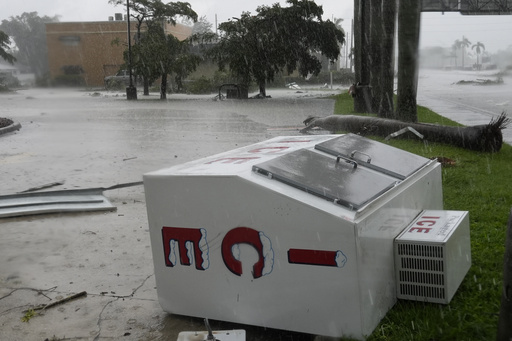FT. PIERCE, Fla. — A series of tornadoes generated by Hurricane Milton took many residents in Florida by surprise, as they initially prepared for heavy rainfall, fierce winds, and storm surges. These powerful tornadoes were reported crossing roads, tearing off roofs, and uprooting trees and power lines.
Debbie Jones recognized the telltale signs of a tornado when she felt a sudden drop in pressure and experienced her ears popping in the Holiday Pines neighborhood of Ft. Pierce. “Suddenly, the power went out. I started to hear the wind intensify and debris hitting loudly. I immediately shut the hurricane shutters and got out of there with them,” recounted Megan Brown, whose boyfriend is Jones’ son. The family took shelter with their four dogs in a back room, away from any windows.
The National Oceanic and Atmospheric Administration’s Storm Prediction Center has recorded 38 preliminary eyewitness accounts of tornadoes in Florida since Wednesday night. The average number of tornadoes for the state typically hovers around 50 annually, and it is anticipated that the confirmed count will increase after areas are surveyed for damage.
Matthew Elliott, the warning coordination meteorologist at the Storm Prediction Center, commented on the situation, stating, “It will certainly be significant how many tornadoes occurred in such a short timeframe.” Tragically, five fatalities connected to the tornadoes were reported in the Spanish Lakes Country Club area near Fort Pierce. During a White House briefing, Homeland Security Secretary Alejandro Mayorkas indicated that reports suggested up to 10 fatalities linked to tornadoes, but he emphasized that these numbers were provisional.
As observers reported instances of tornado activity, the National Weather Service issued 126 tornado warnings throughout the state.
The intensity of these tornadoes was noted as an unusual aspect of the storm. “This is definitely uncommon,” said Victor Gensini, a meteorology professor at Northern Illinois University. “While hurricanes can create tornadoes, they are typically weak. What we witnessed was much more akin to what we see during springtime in the Great Plains.”
The conditions were particularly conducive for tornado formation as Hurricane Milton lingered offshore, allowing warmth from the sun and atmospheric instability to create an optimal environment. Tornadoes that are produced by hurricanes and tropical storms generally manifest in the storm’s right-front quadrant; however, they can also occur near the eyewall, according to NOAA. Factors such as heat, humidity, and variations in wind speed and direction with altitude – known as wind shear – contribute to the likelihood of tornado occurrences.
Gensini elaborated on the conditions leading to the formation of the tornadoes, stating, “There is an immense amount of swirling occurring.” He noted that those tornadoes thrived in an exceptionally favorable environment.
Earlier in the year, Hurricane Beryl was responsible for producing 65 confirmed tornadoes across various states. The record for the most tornadoes spawned by a hurricane remains 118, which occurred during Hurricane Ivan in 2004. The distinct aspect of the tornadoes associated with Milton is that they occurred solely in Florida and within a brief window of eight to ten hours.
Differentiating the damage caused directly by Milton’s tornadoes may present challenges, but experts emphasize the importance of maintaining precise tornado statistics. Tornado activity generally falls into three main seasons: spring, tropical cyclone season, and late fall and winter. “This underscores that tornadoes can play a significant role in a tropical cyclone, particularly in this instance of a Category three hurricane,” said Elliott.
While climate change contributes to the increasing intensity of hurricanes due to ocean warming, Gensini remarked that he is unaware of any direct link between human-induced climate change and the deadly tornadoes experienced in Florida due to Milton.
Florida has the highest number of tornadoes per square mile compared to any other state, though these usually lack the severity seen in the Midwest and Plains. Nonetheless, a historical outbreak of powerful tornadoes in Central Florida resulted in 42 deaths and over 260 injuries in a single day in February 1998.



